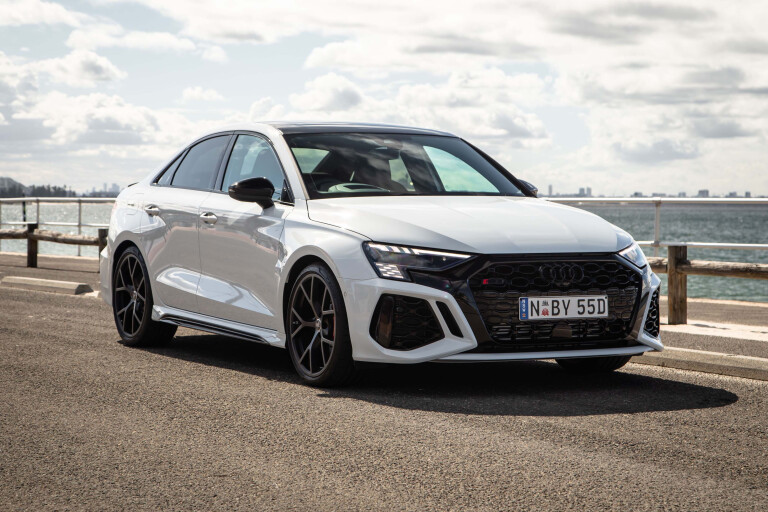
Score breakdown
Things we like
- Elegant but muscular looks
- Brilliant chassis
- Tuneful five-cylinder
- Excellent ride
Not so much
- Not as noisy as before
- It ain’t cheap
- Loud tyres
Audi’s first RS3 was part of the triumvirate of German hyper hatches, with the BMW M140i and AMG A45 for company. That’s a lot of firepower to deal with and the arguments were endless, full of excellent points and counterpoints. Then the (relative) bargain M140i disappeared and we were left with only two choices.
The RS3 was a fun – if slightly flawed – car that was improved after a few years on sale with the addition of the sleeper sedan. For car nerd points, that car rolled on the same short-wheelbase platform of the hatch so had a stubby-looking boot and a tight rear seat.
With a new A3 hatch and sedan, the performance versions have rolled through relatively quickly, the hot S3 and even hotter RS3 now completing Audi’s small car line-up. And the new RS3 has an intriguing new diff that might iron out the wrinkles of the old car.
Psst, hey. When you're done here, you should read this one:
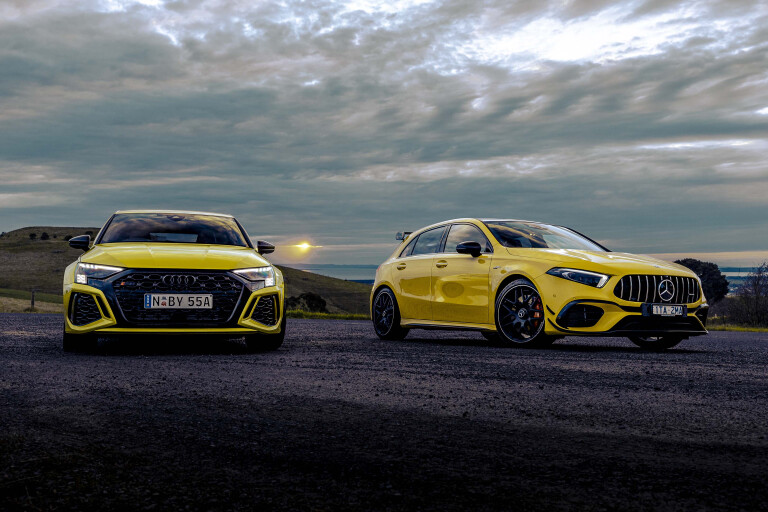
Story continues...
Pricing and features
The second-generation Audi RS3 has landed with a hefty price increase. The hatch starts at $91,391 and the sedan – the car I had – a whopping $93,891 (both before on-road costs).
Yes, prices are up everywhere, but a jump of more than 10 per cent is sobering.
Perhaps surprisingly, it’s the bargain of this tiny segment, with the Mercedes CLA 45 AMG weighing in at $117,687 before on-road costs, which is almost an entire Hyundai i30 hatch more expensive. Or $23,976 if you like your figures in a slightly more relatable format.
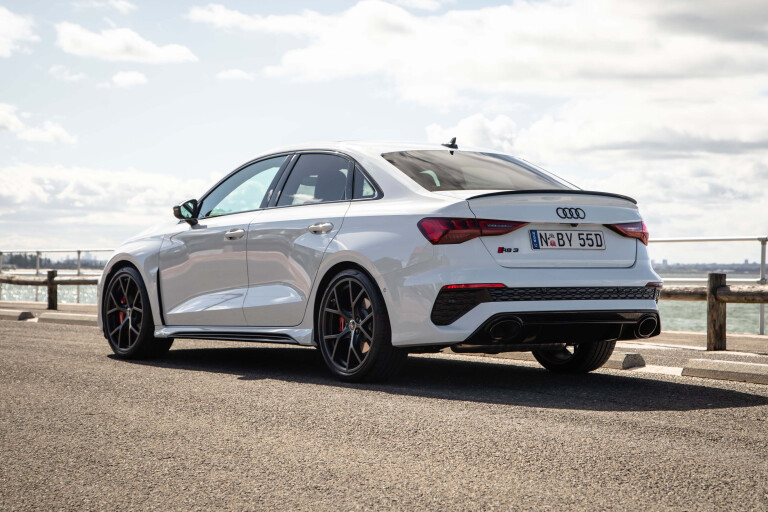
With a new platform underneath it, more aggressive new looks and a predictably sleek new Audi interior, it’s still a lot of money for a car this size. But Audi has softened the blow with a fairly comprehensive feature list.
And a bank of LED lights packed into the headlight assembly animates R-S-3 when you hit the unlock button. Trust me, that never gets old.
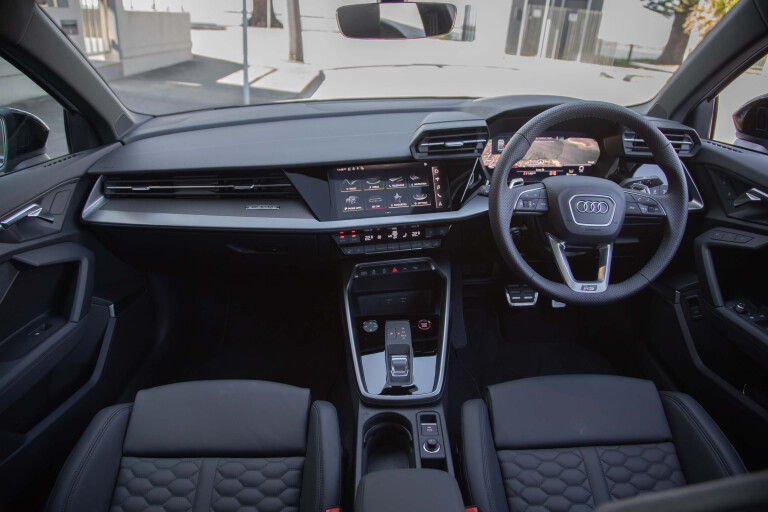
Highlights
| 19-inch cast alloy wheels |
| adaptive dampers |
| Matrix LED headlights |
| electric RS front seats with heating and massage function |
| 12.3-inch configurable digital dashboard |
| head-up display |
| 10.1-inch touchscreen |
| satellite navigation |
| wireless phone charging |
| RS exterior design package |
| DAB+ digital radio |
| 15 Bang & Olufsen-branded speakers |
| Nappa leather upholstery with RS honeycomb stitching |
| reversing camera |
| around-view cameras |
| heated and folding side mirrors |
| power windows front and rear |
| keyless entry and start |
| adaptive cruise control |
| tyre repair kit |
Audi’s MMI system includes sat-nav and Audi Connect Plus online services as well as wireless Apple CarPlay and wired Android Auto. The 15-speaker audio system wears B&O branding and it’s mighty impressive. The touchscreen is beautiful to look at too and offers access to a bunch of functionality.
The RS3 is yet to be tested by either ANCAP or EuroNCAP and it’s probably unlikely to happen, however, the standard front-wheel drive A3 scored five ANCAP stars in 2020.
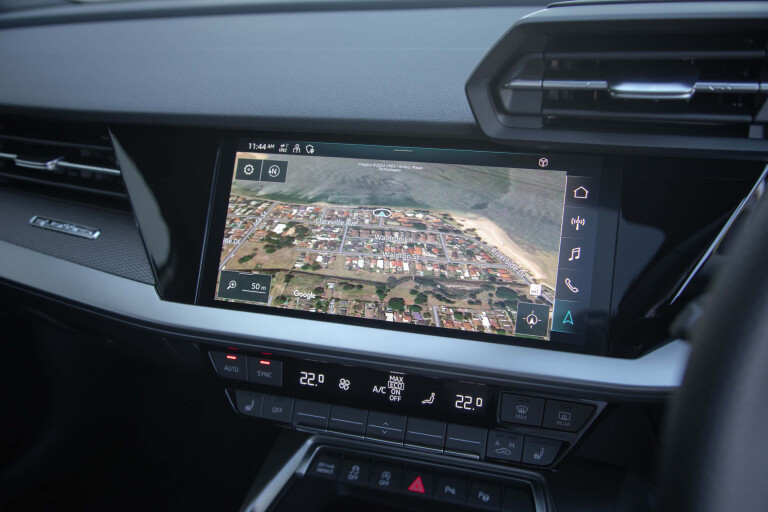
| 7 airbags (including centre front airbag) |
| anti-lock brakes |
| stability and traction controls |
| forward auto emergency braking (up to 250km/h for vehicles, pedestrian and cyclist detection up to 85km/h) |
| reverse AEB |
| forward collision warning |
| blind-spot monitoring |
| rear cross-traffic alert |
| exit warning |
Audi offers several option packages with varying degrees of usefulness and taste.
For a whopping $13,000 you can get the RS Dynamic Package Plus with carbon-ceramic front brakes and calipers painted red, blue or grey.

The $2150 RS Design Package (available in red or green) adds Alcantara steering wheel trim, coloured edges on the seat belts, coloured seat shoulders in Dinamica microfibre, RS floor mats and an accent on the centre bar of the front air vents.
A $7400 Carbon Package adds a carbonfibre lip spoiler, black styling pack, side skirt with carbonfibre inlay and carbonfibre mirror caps.
Finally, for $2000, you can replace the mirror caps and exterior bits in matte aluminium and high gloss on the honeycomb front grille.
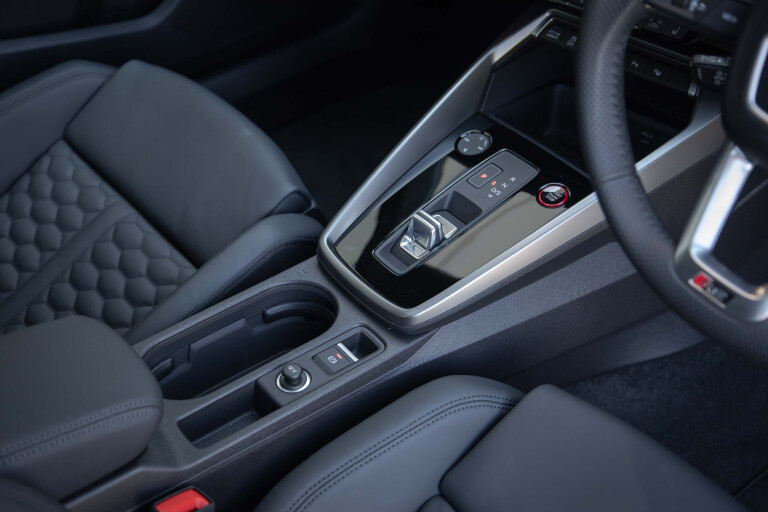
Comfort and space
Sat in the front seat, a lot of screen real estate spans before you. The Virtual Cockpit digital dashboard is as clear and crisp as ever while the big MMI screen integrates beautifully with the dash structure.
The seats are slung low in the chassis so with a low ride height and deep bucket seats, you really are hunkered down in the car. The Nappa leather is lovely, as is the steering wheel – which for once isn’t flat-bottomed. Once you’re in these seats, you’re not going anywhere.
For storage, you have a wireless charging pad, a pair of cup holders, a pair of bottle holders and a bin under the armrest.
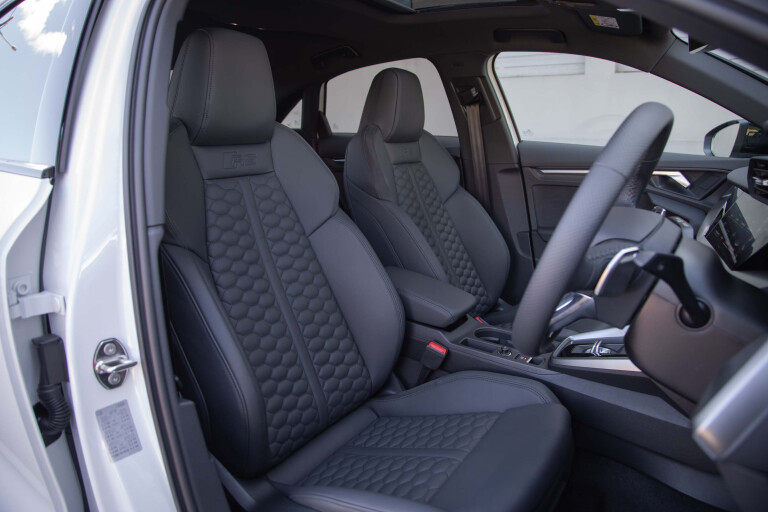
The rear is more welcoming than the old car, with a little more legroom but still no feline-twirling space. It’s fine if you’re under six foot, but the seat is a little on the firm side and the roof does fall towards the rear glass and therefore your bonce. You get two cup holders in the armrest, rear air vents and bottle holders in the doors.
Boot space is a so-so 321 litres and while the seats do fold, there’s no official capacity figure for the available space once you've done so.
If you want a roomier, five-cylinder turbocharged machine, you’ll need to switch to the RSQ3. Which is pretty good fun, too.
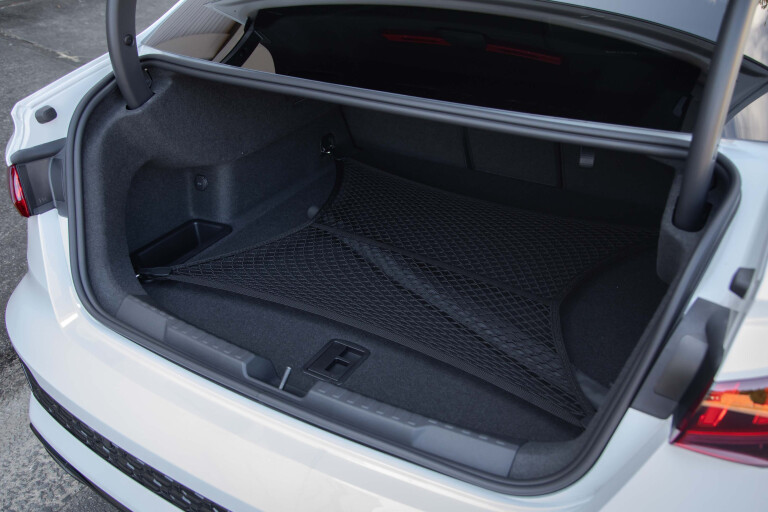
On the road
The core of the RS3 experience has always been the tuneful turbo five-cylinder. With its offbeat vibe, cello-like sound and excellent driveability (with a ton of power to boot), it has dominated this car (and more recently its RSQ3 SUV relative) for over a decade.
In this new car, the same 294kW as the previous car makes a welcome return. Torque is up by 20Nm to a nice round 500Nm, turning all four wheels via a seven-speed dual-clutch auto. Audi Sport’s engineers have spent a lot of time on this driveline, adding a new rear differential.
Everyone is talking about how that delivers a drift mode function to the Drive Select menu. While that’s a good laugh, I think the diff’s overall effect on the new RS3 has been transformative in a broader sense.
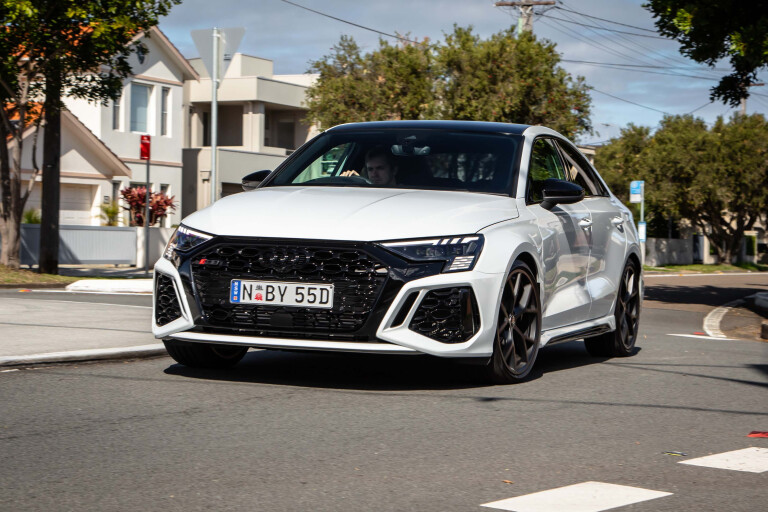
The old car – which I liked very much – had a frustrating flaw. I had many an entertaining argument with internet randos about why it did what it did, with people confidently telling me it was the tyres, suspension geometry, “understeering Audi syndrome” and, of course, a couple of them blamed me for not driving it properly.
And what it did was understeer, but not the way you might expect. When you put the boot in to get out of a corner, the old car would want to wash wide. You really had to wait for the car to straighten before feeding in the power. It was apparent both on road and on the track.
It didn’t ruin the car, but it meant it didn’t have the edge of its BMW rival, the much cheaper M140i. The old A45 had its problems (more than the Audi in my humble opinion, tell me how wrong I am in the comments), but that wasn’t one of them.
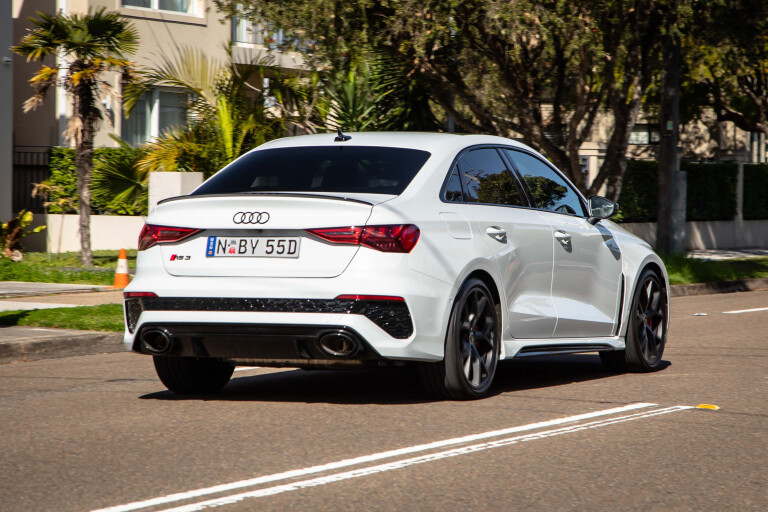
Now, though, that slack is gone. The new diff steps in early to help turn the front end unless you’re driving at insane speeds. The front end is now so much more positive and you can lean on it into the corner knowing it will be there for you when you unleash the power.
It’s subtle, effective and a whole lot more fun. It also means you concentrate more on the corner rather than judging when you should put your foot down.
One of the old car’s strongest features made it through and that’s a suspension set-up that doesn’t want to spit you off the road. My test loop includes a road that is in desperate need of resurfacing and I hope it never is because it’s nail-biting fun in some cars and, in the RS3, brilliant.
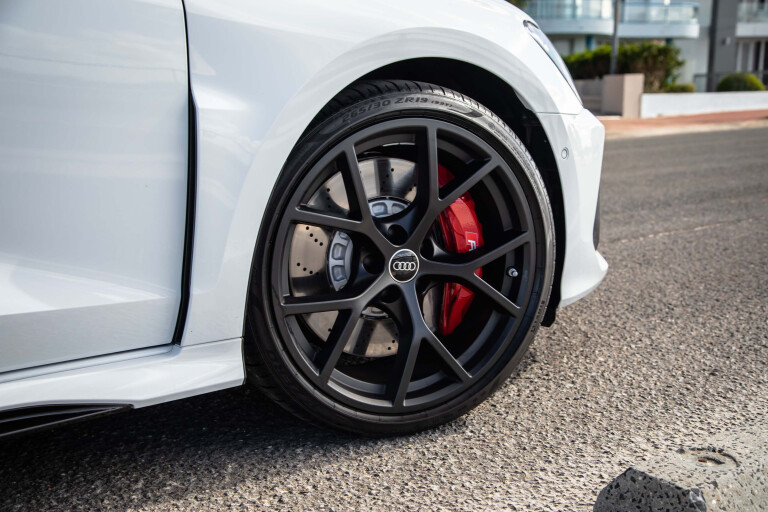
It rides the bumps without unsettling the car or your kidneys, leaving you to steer and brake with a mountain of confidence.
That confidence in the steering comes from the right weight – not too heavy to make an irrelevant sporting point, not so light that you feel disconnected – which matches nicely with the colossal grip you get from the sticky rubber and well-sorted front axle.
Chuck in great brake feel and incredibly strong performance from the standard steel discs, you’ve got everything you need to have plenty of fun with a ton of security.
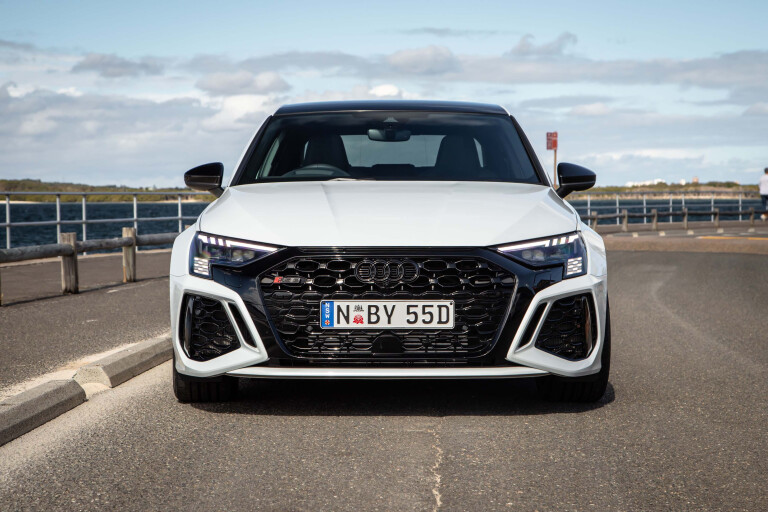
So the fun end of things is sorted. Thing is, when you’re dropping this kind of cash, you want a broad set of capabilities. Here is where the RS3 turns out to be the everyday machine you might want. The suspension is so supple, especially so for a sports sedan but it also out-rides plenty of so-called softer machines.
It shouldn’t be this comfortable, especially running on 19-inch wheels and tyres with less sidewall than a Matchbox car. But there we are, in Comfort mode, and could almost be wafting along in a 2.0-litre TSI A3. Just with really good steering, four hundred horses and chassis that’s track-ready with a flick of a switch.
And if you hit the Rear Torque function, it will do skids with its tricky clutch-pack diff sending all the power to the left or right tyre depending on which way you’re steering. As I don’t have a skidpan handy, I didn’t give that a lash.
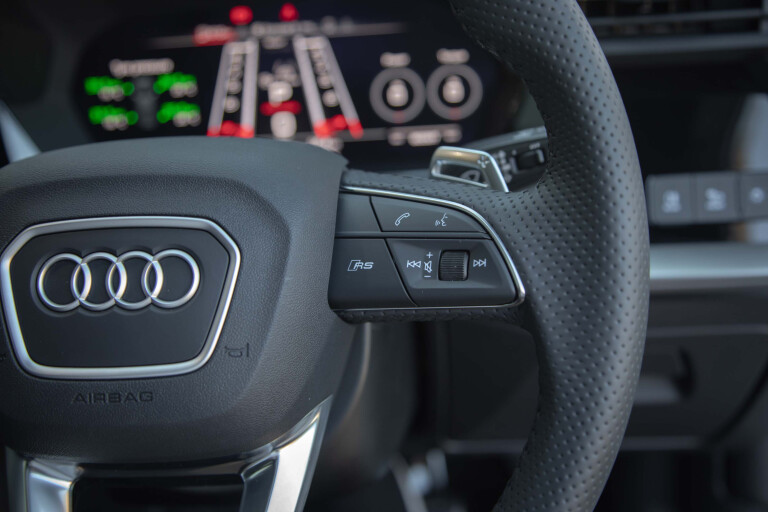
The only real issue I had with the RS3 was the racket from the tyres on motorways. If the surface was smooth, it was fine, but Sydney’s idiotically surfaced motorways produced a fair amount of roar from the rubber. That’s where they get ya – this car might ride like it’s on taller tyres, but you can’t so easily escape the sound.
Audi reckons the RS3 sedan will drink premium unleaded at the rate of 8.2L/100km (0.1L/100km better than the hatch so hey, every little bit helps). My week had plenty of totally normal driving, including a run up the Blue Mountains, the usual suburban rushing about as well as a memorable backroad blast.
The RS3’s trip computer told me I’d used 10.7L/100km, which isn’t a huge miss and startlingly good for a near 300kW headbanger.
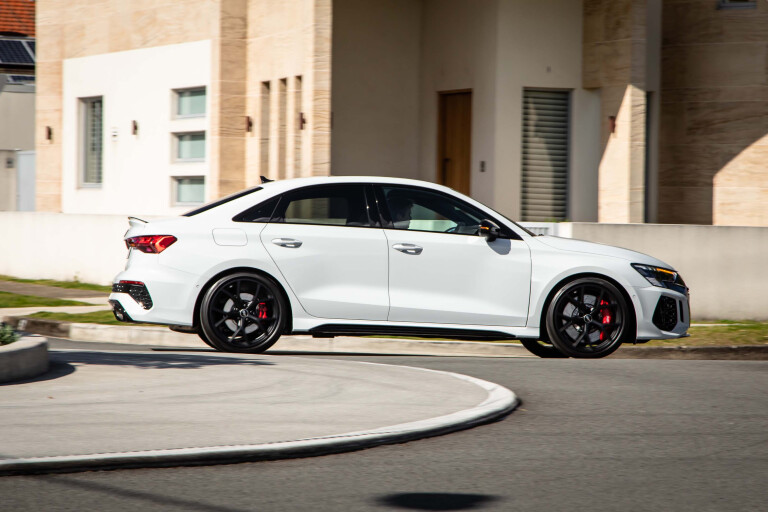
Ownership
Audi’s five-year warranty covers the RS3. There’s even a capped-price servicing regime and an official warranty extension.
Five services cost $3580 ($716 per service on average) and if you want to go nuts, you can add the Audi Advantage pack for $3800. That buys you two more years of warranty and servicing and if you want to double down, you can, for $7600 giving you nine years of warranty and servicing.
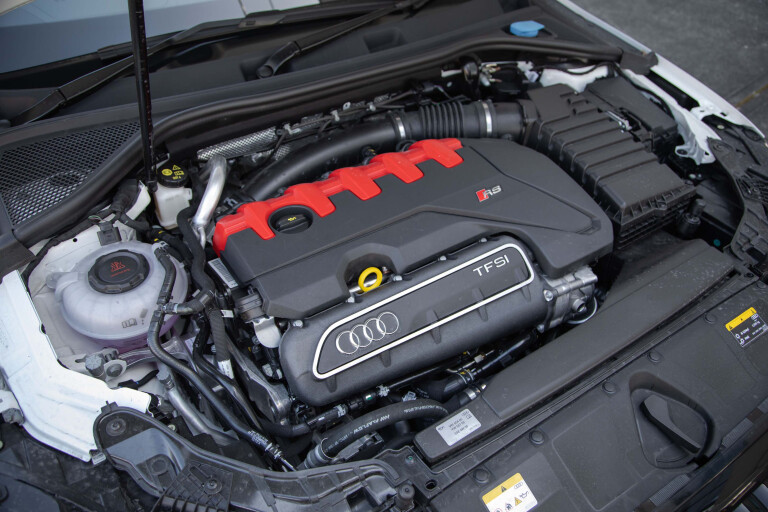
VERDICT
The RS3 is probably the last of the line, but if you’re gonna go, go out with an instant classic. While the previous car was a blast, it didn’t have that final edge to take on the Merc or the BMW with which it traded blows.
A sensible set of changes – and rolling on the much more modern MQB Evo platform – results in the 2023 RS3 being an absolute belter. More engaging, more inspiring, more fun.
Complaining it costs a lot doesn’t really come into it at this level – nobody is paying more than ninety grand for a car with their hard-headed accountant’s blessing.
At this price point, you’re after something that moves you and the RS3 does that spectacularly well.
Now get onto this one:
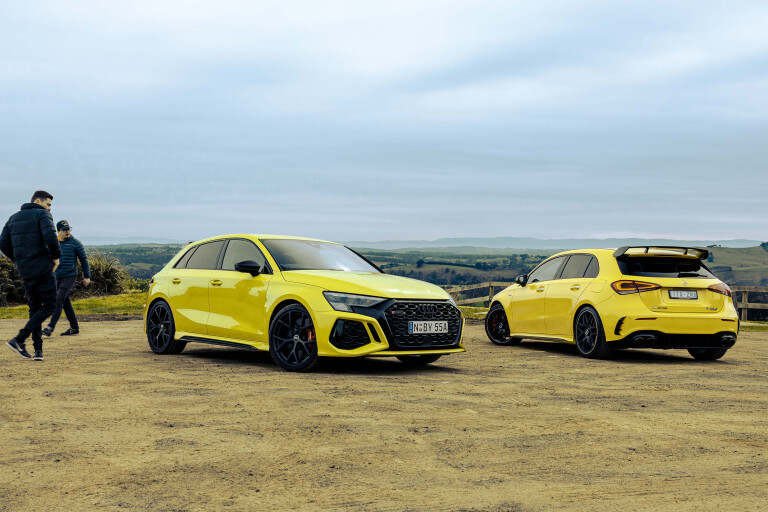
2022 Audi RS3 sedan specifications
| Body | 4-door, 5-seat small sedan |
|---|---|
| Drive | all-wheel |
| Engine | 2.5-litre five-cylinder turbo-petrol |
| Transmission | 7-speed dual-clutch transmission |
| Power | 294kW @ 7000rpm |
| Torque | 500Nm @ 2250-5600rpm |
| Bore stroke (mm) | 82.5 x 92.8 |
| Compression ratio | 10.0 : 1.0 |
| 0-100km/h | 3.8 sec (claimed) |
| Fuel consumption | 8.2L/100km (combined) |
| Weight | 1570kg |
| Suspension | MacPherson struts front/multi-link rear |
| L/W/H | 4389mm/1851mm/1463mm |
| Wheelbase | 2636mm |
| Brakes | 375mm discs with 6-piston calipers front/310mm discs rear |
| Tyres | 265/30 ZR19 front/ 245/35 ZR19 rear |
| Wheels | 19-inch alloy (puncture repair kit) |
| Price | $93,891 + on-road costs |
Score breakdown
Things we like
- Elegant but muscular looks
- Brilliant chassis
- Tuneful five-cylinder
- Excellent ride
Not so much
- Not as noisy as before
- It ain’t cheap
- Loud tyres

COMMENTS